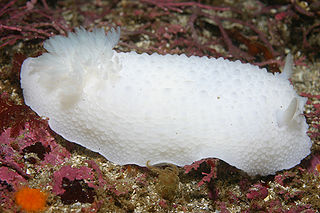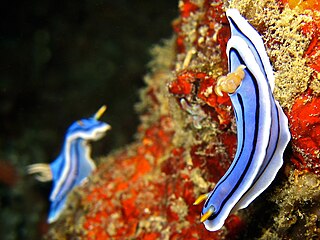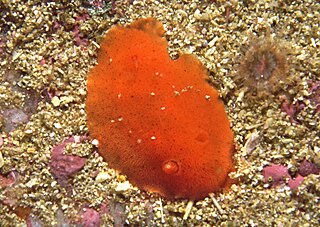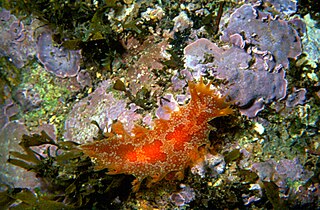
Doridoidea, commonly known as dorid nudibranchs, are a taxonomic superfamily of medium to large, shell-less sea slugs, marine gastropod mollusks in the clade Doridacea, included in the clade Nudibranchia.

Chromodorididae, or chromodorids, are a taxonomic family of colourful, sea slugs; dorid nudibranchs, marine gastropod mollusks in the superfamily Doridoidea. “Chromodorid nudibranchs are among the most gorgeously coloured of all animals.” The over 360 described species are primarily found in tropical and subtropical waters, as members of coral reef communities, specifically associated with their sponge prey. The chromodorids are the most speciose family of opisthobranchs. They range in size from <10mm to over 30 cm, although most species are approximately 15–30 mm in size.

Aldisa is a genus of sea slugs, dorid nudibranchs, marine gastropod molluscs in the family Cadlinidae.

Chromodoris is a genus of very colourful sea slugs or dorid nudibranchs, marine gastropod molluscs, and the type genus of the family Chromodorididae. Within the genus Chromodoris, there are currently 101 classified species. Species within Chromodoris are commonly found in tropical and subtropical waters, living as members of reef communities and preying primarily on sponges. A molecular phylogeny of the family Chromodorididae resulted in this genus being restricted to a smaller number of species than formerly, most of which have longitudinal black lines on the mantle. Many former members of Chromodoris were transferred to Goniobranchus

Glossodoris is a genus of sea slugs, dorid nudibranchs, shell-less marine gastropod mollusks in the family Chromodorididae.

Discodorididae is a taxonomic family of sea slugs, specifically dorid nudibranchs, marine gastropod mollusks in the superfamily Doridoidea.

The Facelinidae are a taxonomic family of colorful sea slugs. These are specifically aeolid nudibranchs. They are marine gastropod molluscs.

Actinocyclus is a genus of sea slugs, dorid nudibranchs, shell-less marine gastropod molluscs in the family Actinocyclidae, and was first described by Christian Gottfried Ehrenberg in 1831.

Hallaxa is a genus of sea slugs, dorid nudibranchs, shell-less marine gastropod molluscs in the family Actinocyclidae.
Asteronotus is a genus of sea slugs, dorid nudibranchs, shell-less marine gastropod molluscs in the family Discodorididae.

Platydoris is a genus of sea slugs, dorid nudibranchs, shell-less marine gastropod mollusks in the family Discodorididae. These nudibranchs are large and often brightly coloured, but normally live concealed beneath rocks or loose coral, feeding on sponges. During the night they become more active, searching for new food sources or mates. Many species were described in the 19th century and a revision in 2002 added six new species.

Marionia is a genus of sea slugs, specifically dendronotid nudibranchs, marine gastropod molluscs in the family Tritoniidae.

Actinocyclus verrucosus is a species of sea slug or dorid nudibranch, a marine gastropod mollusk in the family Actinocyclidae.

Actinocyclus papillatus is a species of sea slug or dorid nudibranch, a marine gastropod mollusk in the family Actinocyclidae.
Hallaxa apefae is a species of sea slug or dorid nudibranch, a marine gastropod mollusk in the family Actinocyclidae.
Hallaxa michaeli is a species of sea slug or dorid nudibranch, a marine gastropod mollusk in the family Actinocyclidae.
Hallaxa paulinae is a species of sea slug or dorid nudibranch, a marine gastropod mollusk in the family Actinocyclidae.
Hallaxa albopunctata is a species of sea slug or dorid nudibranch, a marine gastropod mollusk in the family Actinocyclidae.
Hallaxa translucens is a species of sea slug or dorid nudibranch, a marine gastropod mollusk in the family Actinocyclidae.

Phanerophthalmus is a genus of medium-sized sea snails or bubble snails, marine opisthobranch gastropod molluscs in the family Haminoeidae, the haminoea bubble snails, part of the clade Cephalaspidea, the headshield slugs and bubble snails.













